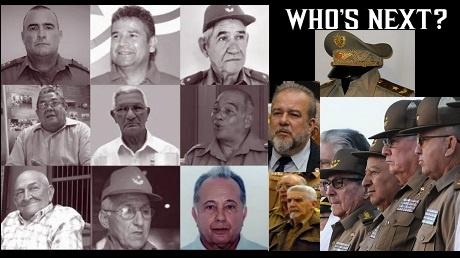 A ninth high-ranking Cuban military officer died this weekend, the regime's Ministry of the Revolutionary Armed Forces (MINFAR) said Sunday.
A ninth high-ranking Cuban military officer died this weekend, the regime's Ministry of the Revolutionary Armed Forces (MINFAR) said Sunday.
A statement from the dictatorship broadcast by the regime's state-run television station on Sunday reported the death of Felix Baranda Columbié, who died Saturday of COVID-19-disease caused by the CPC virus.
Baranda becomes the ninth high-ranking military member of the Cuban regime to die since the first case reported by the regime or the pro-government press on July 17.
Baranda is the ninth high-ranking military member of the Cuban regime to die since the first case reported by the regime or the pro-government press on July 17.
According to reports, Baranda served as a fighter in the Second Frank País Eastern Front led by Raul Castro. At the end of the Cuban Revolution in 1959, he was part of the National Revolutionary Police (PNR), and in 1964 he served as head of MINFAR.
Baranda was also a member of the National Revolutionary Police (PNR).
In addition, Baranda was a militant of the Communist Party of Cuba (PCC) and member of the 3rd Congress of the Central Committee of the Communist Party of Cuba (CCPCC).
The general's remains-as well as the rest of the military dead-will be cremated.
Between July and August, the Cuban regime has reported the deaths of several military personnel-even the dictatorship reported the deaths of six of them in an astonishing ten-day span, without disclosing the causes of their deaths in most cases.
These peculiar events have generated questions about the true cause of their deaths by the independent press and several dissident Cubans on social networks.
Cuban political scientist Julio M. Shiling told The Epoch Times in August that it was "no coincidence" that since the popular uprising that began on July 11, six generals from the Armed Forces and the Interior Ministry have died.
For Shiling, these cases demonstrate that there are "fissures" within the Castro regime and that the regime's public announcements of such deaths are intended to promote terror.
"This is becoming more and more like an Agatha Christie novel," Shiling said. "It's no coincidence all these numbers of dead people and the disappearance of any kind of physical evidence of their bodies."
"When Castro-communism takes these measures, it is quite predictable to conclude that there was some contentious reference or some exclamation of disapproval. It doesn't necessarily mean that any of these deceased generals were actively conspiring or intended to do so-simply that at any mild proclamation or pronouncement of discontent, the Castro regime will quickly eliminate it so that it doesn't have a 'contagion effect' on other people," he added."
"A lot of times, a lot of the time, the Castro regime will take a lot of measures to prevent the 'contagion effect' on other people," he added.
"Many times dictatorial regimes seek and deal with the lesser evil," he noted. "They understand well that the worst enemy is spontaneity and the concertation of opposing forces that could confront them, including forces that could come from within their own power structure. So, terror is the most fundamental medicine to confront this," he said.
 Author: Alicia Marquez. Follow Alicia Marquez on Twitter: @AliceMqzM
Author: Alicia Marquez. Follow Alicia Marquez on Twitter: @AliceMqzM
Con información de Pachi Valencia.

